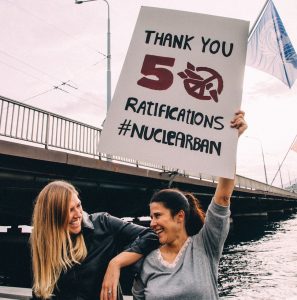
On October 24, 2020, the UN Treaty on the Prohibition of Nuclear Weapons (the Treaty) reached the required 50 states parties for its entry into force, after Honduras ratified it just one day after Jamaica and Nauru submitted their ratifications. The Treaty will enter into force on January 22, 2021, instituting a ban on nuclear weapons, 75 years after their first use.
This milestone means the Treaty will become international law on January 22, 2021, increasing pressure on nuclear armed states and other countries to support the treaty. The treaty now has 84 signatories and 50 states parties.
Below is a statement by ICAN Australia dated October 24, 2020 in recognition of this milestone:
History was made today as the number of countries ratifying the UN Treaty on the Prohibition of Nuclear Weapons reached 50. Honduras ratified the treaty overnight bringing the world a step closer to the abolition of nuclear weapons. Just a day ago, on United Nations Day, Jamaica and Nauru ratified the treaty.
This milestone means the treaty will become international law on January 22, 2021, increasing pressure on nuclear armed states and other countries to support the treaty. It now has 84 signatories and 50 states parties.
Entry-into-force will cement the illegality of nuclear weapons in international law. This change will influence the behaviour of states, even those which don’t join the treaty, interrupt the flow of funds to nuclear arms producers, stimulate debate and increase pressure on treaty hold-outs.
Why is entry-into-force important?
- All countries that have ratified the Treaty will be bound by it.
- It establishes clearly that nuclear weapons are inhumane, unacceptable, and now illegal, and that no state should possess, use or threaten to use them.
- It puts Australia out of step with international law on nuclear weapons.
- A ban treaty can change the behaviour of countries that haven’t joined, as demonstrated by the bans on landmines and cluster munitions.
- More financial institutions will divest from companies that produce nuclear weapons, in line with policies to exclude weapons banned by international law.
- It creates pressure and momentum for more nuclear weapons abolition action.
Just days before the 50th ratification, the Trump administration sent a letter to signatories urging them to withdraw their support for the Treaty as it was supposedly a danger to the half-century-old Nuclear Nonproliferation Treaty, described as the cornerstone of global nonproliferation endeavours.
In response, Beatrice Fihn, executive director of ICAN, dismissed this letter as “straightforward lies”. She stressed that the Nonproliferation Treaty “is about preventing the spread of nuclear weapons and eliminating nuclear weapons, and this treaty implements that. There’s no way you can undermine the Nonproliferation Treaty by banning nuclear weapons. It’s the end goal of the Nonproliferation Treaty.”
ICAN noted that this “brazen, and unsuccessful, attempt to undermine international law demonstrates significant desperation to prevent the ban taking effect.”
The statement by ICAN Australia concludes by indicating that the “next step is to ensure Australia joins this growing global movement by signing and ratifying the treaty. In doing so, our government would end the dangerous fallacy of “extended nuclear deterrence”. Far from protecting us, nuclear weapons threaten our very existence.”
Notes
For more details on the impact of entry-into-force on Australia, read ICAN’s briefing paper.
Hear the interview with Tilman Ruff (co-founder of ICAN) on ABC’s Late Night Live, Oct 26, 2020 (17mins 12secs).
Read Tilman Ruff’s ‘Nuclear weapons – always inhumane and unacceptable, now illegal’, AIM, Oct 30, 2020.
To take action, click here.